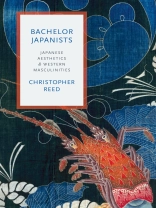Challenging clichés of Japanism as a feminine taste, Bachelor Japanists argues that Japanese aesthetics were central to contests over the meanings of masculinity in the West. Christopher Reed draws attention to the queerness of Japanist communities of writers, collectors, curators, and artists in the tumultuous century between the 1860s and the 1960s.
Reed combines extensive archival research; analysis of art, architecture, and literature; the insights of queer theory; and an appreciation of irony to explore the East-West encounter through three revealing artistic milieus: the Goncourt brothers and other japonistes of late-nineteenth-century Paris; collectors and curators in turn-of-the-century Boston; and the mid-twentieth-century circles of artists associated with Seattle’s Mark Tobey. The result is a groundbreaking integration of well-known and forgotten episodes and personalities that illuminates how Japanese aesthetics were used to challenge Western gender conventions. These disruptive effects are sustained in Reed’s analysis, which undermines conventional scholarly investments in the heroism of avant-garde accomplishment and ideals of cultural authenticity.
İçerik tablosu
A Note on Names and Terms
Acknowledgments
Introduction
1. Originating Japanism: Fin-de-Siècle Paris
2. Bachelor Brahmins: Turn-of-the-Century Boston
3. Sublimation and Eccentricity in the Art of Mark Tobey: Seattle at Midcentury
Conclusion: On the End of Japanism
Notes
Bibliography
Index
Yazar hakkında
Christopher Reed is professor of English and visual culture at the Pennsylvania State University. He is the author of many books, including
Art and Homosexuality: A History of Ideas (2011) and
Bloomsbury Rooms: Modernism, Subculture, and Domesticity (2004).












